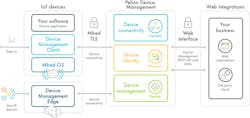Arm’s Pelion IoT Platform provides an end-to-end computing solution for IoT applications (see figure). When initially announced, Pelion devices could run Arm’s Mbed OS that targets Cortex-M class microcontrollers. It’s possible to run the compact Mbed OS on other platforms like Arm’s Cortex-A application processors, too, but these typically run higher-end operating systems like Linux.
Mbed OS is designed to be an IoT stack in a small footprint. It includes features like over-the-air (OTA) updates and basic operating system services that can easily fit into a microcontroller. A simple memory protection unit (MPU) can be used instead of the memory management unit (MMU) found in a Cortex-A platform. Mbed OS also assumes a single core.
Arm’s Pelion IoT Services encompasses the cloud and a plethora of IoT devices, including those running the Mbed OS and Mbed Linux.
Cortex-A platforms are often multicore. They have more memory and features like an MMU and often virtual-machine support. Mbed OS doesn’t even address this level of functionality, but it can be very useful for IoT gateway applications. This is where Mbed Linux comes into play.
Mbed Linux builds Mbed stacks and APIs on top of embedded Linux. As a result, developers can migrate Linux applications to Mbed Linux with Linux’s full functionality while gaining access to the Mbed APIs, including Pelion Device Management (PDM) support.
Mbed Linux is still a work in progress. The initial release is planned for the spring of 2019. A developer preview version will be available soon. Popular boards will initially be targeted, such as the Raspberry Pi 3 and NXP’s i.MX 7Solo-based WaRP7, but it can be ported easily to any Cortex-A platform. It will support Arm’s Platform Security Architecture (PSA) principles, including secure boot and signed updates.
Linux applications can be deployed using OCI-compliant containers, which helps improve security and provides developers with a modular platform.
Like Mbed OS, Mbed Linux is an open-source project. It can be used for free, including the latest updates. Arm will provide commercial support for customers who need firm SLA and platform longevity support. The cost for these services is available from Arm.
About the Author
William G. Wong
Senior Content Director - Electronic Design and Microwaves & RF
I am Editor of Electronic Design focusing on embedded, software, and systems. As Senior Content Director, I also manage Microwaves & RF and I work with a great team of editors to provide engineers, programmers, developers and technical managers with interesting and useful articles and videos on a regular basis. Check out our free newsletters to see the latest content.
You can send press releases for new products for possible coverage on the website. I am also interested in receiving contributed articles for publishing on our website. Use our template and send to me along with a signed release form.
Check out my blog, AltEmbedded on Electronic Design, as well as his latest articles on this site that are listed below.
You can visit my social media via these links:
- AltEmbedded on Electronic Design
- Bill Wong on Facebook
- @AltEmbedded on Twitter
- Bill Wong on LinkedIn
I earned a Bachelor of Electrical Engineering at the Georgia Institute of Technology and a Masters in Computer Science from Rutgers University. I still do a bit of programming using everything from C and C++ to Rust and Ada/SPARK. I do a bit of PHP programming for Drupal websites. I have posted a few Drupal modules.
I still get a hand on software and electronic hardware. Some of this can be found on our Kit Close-Up video series. You can also see me on many of our TechXchange Talk videos. I am interested in a range of projects from robotics to artificial intelligence.



